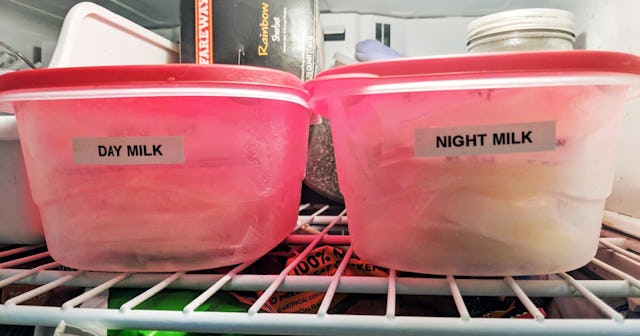Breastmilk Pumped At Night Has Higher Levels Of Melatonin

A birth doula recently went viral on Facebook sharing the difference between “day milk” and “night milk”
Did you know that your breast milk has its own circadian rhythm? It’s true. Many moms know that breast milk undergoes biochemical changes during a feeding — from the watery foremilk to creamier hindmilk. But there’s also a difference between “day milk” and “night milk,” which could play a role in your baby’s sleep pattern if they’re drinking pumped milk.
Sarah Fillmore, an Iowa-based licensed birth doula, recently shared a post about the difference in this type of pumped milk on Facebook. The post quickly went viral.
“One of the amazing qualities of human milk is how its composition changes throughout the day,” she writes. “Milk produced in the morning has three times the level of cortisol, a hormone that promotes alertness, than milk made at night.”
“Night milk is higher in melatonin, which encourages sleep,” she continues. And she’s right. According to the La Leche League, several substances that vary in accordance with the mother’s circadian rhythms — including some amino acids, melatonin, trace elements, and even a few nucleotide (the building blocks in many important biological processes) — all have the power to affect a baby’s circadian rhythm through breastmilk.
Another study says offering an infant a bottle of morning milk in the evening, with its high cortisol and low melatonin, might be the “nutritional equivalent of flipping the lights on right before bedtime.” Which means infants who drink “mistimed” milk may struggle more with sleep, digestion, and development.
Yikes! As a mom who breastfed my first child for 13 months and am due any day with my second, I had no idea about any of this when it comes to pumping milk. And as we all know, good sleep is so very, very precious for both baby and mom.
A few other interesting facts about the timing of breastmilk:
- Iron in milk peaks at around noon
- Vitamin E peaks in the evening
- Minerals like magnesium, zinc, potassium, and sodium are all highest in the morning
- Immune system concentrations in day milk are higher compared to night milk
- Melatonin, which promotes sleep and digestion, peaks around midnight
Fillmore tells Scary Mommy the response to her viral post has been overwhelming. “I’m glad this information is getting out there, because I think it’s a really simple thing you can do to maybe help your baby establish better rhythms,” she says. “I honestly thought this was a much more well-known fact than it seems to be.”
She suggests that breastfeeding moms who are looking to build up a freezer supply should label the milk with the time of day it was pumped, and try to feed it to the baby around the same time of day or night.
“This may help your baby establish better circadian rhythms, and may help you get a better night’s rest.”
This article was originally published on